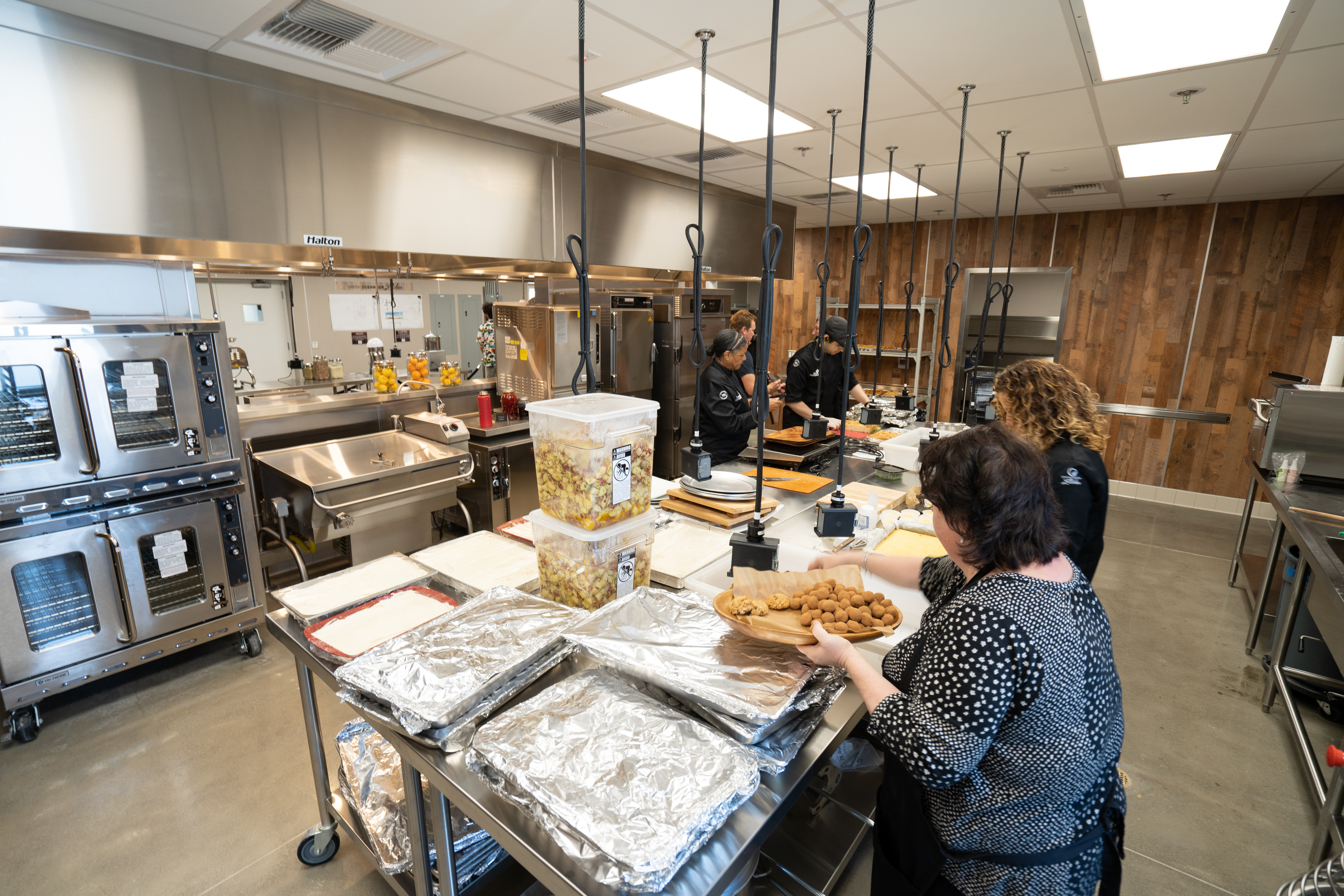Daily Business Report-June 26, 2019
Preparing meals in the new Green Oceanside Kitchen. (Photos courtesy of the city of Oceanside)
City of Oceanside unveils innovative
food recovery and preservation kitchen
The city of Oceanside has opened the doors to its Green Oceanside Kitchen—a state-of-the-art food recovery and preservation facility at the El Corazon Senior Center, providing innovative solutions to food waste, hunger and environmental and culinary education in North County.

One of the most comprehensive facilities of its kind in the nation, the Green Oceanside Kitchen is the result of a public-private partnership between the city of Oceanside and O’side Kitchen Collaborative (OKC). The facility includes a 1,700 square foot commercial kitchen, a 500-square- foot freezer that can hold about a semi-truck load of food and an interactive demonstration kitchen for culinary arts training and education. The facility was designed to maximize food recovery and preservation with specialty equipment installed throughout.
The city and OKC will work together to recover agricultural surplus from local farms, growers and gleaning organizations annually, with OKC using the city’s facility to transform the produce into cuisine and preserved products, nutritious meals and offer full-service catering for a cause.
Community workshops and cooking classes will also be provided at the kitchen to raise awareness about the issues and educate participants on solutions to food waste.
“The Green Oceanside Kitchen aims to fill a significant hole in our food system by providing a location and services to preserve food, reduce waste, feed our community, and provide job training and education for being better stewards of the earth,” said Colleen Foster, environmental officer for the city of Oceanside.
__________________

General Atomics Orbital Test Bed
Satellite successfully launched
General Atomics Electromagnetic Systems (GA-EMS) announced today that its Orbital Test Bed satellite was successfully launched on-board the SpaceX Falcon Heavy rocket from Cape Canaveral. The launch, sponsored by the U.S. Air Force’s Space Technology Program 2, is delivering 25 separate satellites into low Earth orbit.
The company’s Orbital Test Bed spacecraft hosts multiple payloads for on-orbit technology demonstration. The OTB hosted payloads launched Tuesday include: NASA’s Space Technology Mission Directorate’s Deep Space Atomic Clock, designed and built at NASA’s Jet Propulsion Laboratory, to support deep space navigation and exploration; a Modular Solar Array developed for the U.S. Air Force Research Laboratory; an Integrated Miniaturized Electrostatic Analyzer sensor payload developed by cadets at the U.S. Air Force Academy; the RadMon next generation radiation effects monitor; the FlexRX programmable satellite receiver; and Celestis cremains.
__________________
James Soto Antony appointed
UCSD Graduate Division dean

James Soto Antony has been appointed dean of the Graduate Division at the University of California San Diego, effective Sept. 1, 2019. A University of California alumnus, Antony currently serves on the faculty of the Graduate School of Education at Harvard University, and is director of Harvard’s Higher Education Program. At UC San Diego, Antony will also hold a tenured faculty appointment in the Department of Education Studies.
Antony holds both a doctorate and masters in Higher Education and Organizational Change as well as a baccalaureate degree in psychology, all from UCLA.
At Harvard, Antony also co-directs the university’s Management Development Program, which provides higher education leaders with the tools and insight to think more strategically, balance competing demands, and engage in dynamic leadership.
Prior to Harvard, Antony served as associate provost for Yale University, where he was involved with issues ranging from faculty development and diversity, to undergraduate leadership development. His experience also includes serving as a faculty member and associate dean of the Graduate School at the University of Washington where he led the creation of several graduate programs.
__________________
Cubic appoints Jim Colson as VP
and chief technology officer

Cubic Corporation announced the appointment of Jim Colson as vice president and chief technology officer. Colson will join Cubic’s executive team to define and drive transformative platforms, including cloud and mobile across all Cubic business divisions. Colson’s extensive experience in transformation; Internet of Things (IoT); Software as a Service (SaaS) and Cloud; Mobile; Artificial Intelligence (AI); and Machine Learning (ML) will help shape the company’s transformation platforms and emerging business models.
Colson retired from IBM as an IBM Fellow, vice president and worldwide CTO for the AI and ML infused Watson Customer Engagement portfolio. Colson began his IBM career as a senior technical staff member where he worked in robotics and automotive telematics, leading to the creation of a new embedded IoT software business for the company. Throughout his tenure, he held roles of increasing leadership responsibilities across mobile, smarter cities and collaboration systems, while driving market changing ecosystem contributions in intellectual property, open source and open standards.
__________________
Reality Changers names Tamara Craver
as new president and chief executive officer

The Board of Reality Changers of San Diego announced the appointment of Tamara Y. Craver as the organization’s new president and chief executive officer. Craver has over 20 years of experience in nonprofit fundraising and executive leadership. She will begin her new leadership role on Aug. 1, succeeding Interim Executive Director and Board Chair, Kimberley Phillips Boehm. “We are thrilled to have such an accomplished leader in college access as the next CEO of Reality Changers,” Boehm said. “Tamara is a passionate advocate for first-generation college students.”
Tamara Craver brings a range of abilities as a fundraiser and executive. During her 12 years as director of The Posse Foundation, Los Angeles, Craver built the office from a small staff and budget to the second largest office within the Posse Foundation. Under her leadership, the Los Angeles office dramatically increased the number of students it prepared for and then mentored through its 10 partner colleges and universities. In addition to leading a successful office, Craver increased the annual revenue from $700,000 to over $2.5 million per year. She established enduring relationships with partner colleges across the nation. Prior to her role with Posse, Craver served as director of development and communications for Torrance South Bay YMCA and as director, social markets for the American Heart Association, Western States Affiliates.
__________________
Search begins for the next general
manager of the County Water Authority
The San Diego County Water Authority has hired the executive search firm William Avery & Associates to manage the recruitment and selection of the agency’s next general manager.
The Los Gatos-based Avery & Associates has decades of experience recruiting candidates for public and private sector positions. After a competitive selection process, a work group of the Water Authority’s Board of Directors chose the firm to fill the position vacated in March by the retirement of longtime Water Authority General Manager Maureen Stapleton.
The hiring process will include outreach to civic, business, and community stakeholders to help guide the Board’s assessment of candidates.
The board aims to hire a new general manager by the end of this year. Acting General Manager Sandy Kerl will continue to lead the agency’s staff during the hiring process.
__________________
Big Brothers Big Sisters names Lorie Zapf
as president and chief executive officer

Big Brothers Big Sisters of San Diego County has chosen Lorie Zapf, a former member of the San Diego City Council, as the organization’s next president and CEO. Zapf brings more than 30 years of leadership experience from the private, nonprofit and public sectors. Her diverse career began as a broadcast journalist in radio and television and includes management and executive level positions in public relations and media, non-profit work, founding and operating a successful natural food company that she helped grow to national distribution, and most recently as a two-term city councilmember.
Zapf earned her bachelor’s degree in broadcast journalism from Cal State Northridge and her master’s degree in applied communications from the University of Denver.
Zapf represented City Council District 2. She was first elected to office in November 2010 serving District 6, but switched districts in 2014 due to redistricting. In 2018 Zapf lost a bid for reelection, becoming one of the first incumbent council members to lose a reelection campaign since 1992.
__________________
Banking on Cannabis:
Bill would allow industry to use state banks
California’s cannabis industry, a cash-only business now, could start using specially chartered state banks, under legislation that passed another hurdle Monday.
Background: Because marijuana is illegal under federal law, banks could be prosecuted if they conduct business with cannabis growers and retailers. As a result, the weed business operates on cash.
Democratic Senator Bob Hertzberg of Los Angeles is carrying Senate Bill 51, which is intended to give state banks and credit unions a limited charter to provide some services to state-licensed cannabis businesses. It would:
- Authorize banks and credit unions to accept deposits and issue special-purpose checks.
- Allow cannabis business owners to use those checks to pay fees or taxes and rent on property they lease.
The Assembly Banking Committee approved it 8-0.
Herzberg: “Receipts will only continue to grow in the coming years, and it is unacceptable for cannabis businesses to have to continue arriving to government offices with duffel bags of cash to fulfill their tax obligations.”
The U.S. House of Representatives is considering the Secure And Fair Enforcement Banking Act to permit banks to do business with cannabis operators. The bill has 206 co-sponsors, including 44 members of California’s congressional delegation.
Like the federal legislation, Hertzberg’s bill has Democratic and Republican support.
Lobbyist Amy Jenkins, of the California Cannabis Industry Association: “It’s important to move this bill forward as that debate in Congress continues. We tend to move a little faster in California.”
Click here for a backgrounder on the issue.
__________________
MiraCosta College simplified financial
aid application process for students
MiraCosta College students will face less paperwork when applying for financial aid, thanks to a new online filing system that can be accessed via cell phone, tablet, or computer and provides immediate status updates.
The MiraCosta College Financial Aid Office this fall is rolling out a new software program called CampusLogic with the goal of making federal verification of files more efficient and allowing staff to get its work done faster. As a result, financial aid staff should have more time for campus outreach and working with students individually.
“This will cut down on the number of forms students have to fill out and it puts everything online,” said Financial Aid Technician Sokhea Chap, who has been spending much of the summer training staff on the new system. “It simplifies the process for students while streamlining the process for us.”




